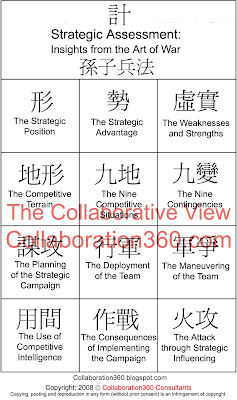 Currently our global economy is overwhelmed with random chaos. Some people look at divine inspiration as an alternative.
Currently our global economy is overwhelmed with random chaos. Some people look at divine inspiration as an alternative.
The key to adjusting to this state of random chaos is to have a process that allows one to stay on the tangible course while minding the grand picture.
Our solution is based on these three steps:
- Assessing the grand picture;
- Positioning by planning and preparing a master plan with detailed specifics; and
- Implementing by utilizing the strategic overview as a standard in completing your goal.
Assess the grand picture means understanding the grand settings through proper information gathering steps. Then, evaluating the information with a proper set of strategic assessment protocols.
If one does not know their grand settings, there is no way he or she will be able to anticipate what is ahead.
--- More to come.
If you want to know about how to build a good plan, please contact us at service[@t]collaboration360[doott].com
Replace @t with "@" and doott with "." .
Collaboration360 Consultants (C360). Copyright:2006-2009 © All rights reserved
Copying, posting and reproduction in any form (without prior consent) is an infringement of copyright.#
Faith and FinancesRob Baedeker, Special to SF Gate
Monday, January 19, 2009
Try a Google search for "lost faith" and you'll get plenty of stories about crises of religious belief. But these days you're also likely to see headlines like this one about lost faith in Wall Street and the economy in general.
The road to the free-market promised land may indeed have been paved with a confidence bordering on religious conviction. But now that financial markets have faltered, are believers turning to old-fashioned religious faith for solace and direction?
When I spoke with Bay Area clergy to see if they'd noticed an increase in the number of congregants coming to them for guidance due to financial distress, most echoed Kalid Siddiqi, the imam for Friday prayer at the Masjid Darussalam in San Francisco. "All kinds of people have approached me for counseling," Saddiqi told me. "I have been in this country 24 years, and I have never seen this kind of uneasiness, financially and economically, among the community."
Others, like Diane Rizzetto, abbess and teacher at the Bay Zen Center in Oakland, said that while the numbers of community members seeking her counsel for money-related issues haven't changed substantially, "There is definitely a sense of uncertainty. There's a tension sort of in the air."
... Across faiths, these clergy see this kind of material assistance as rooted in deeper spiritual convictions.
Friedman explained Judaism's response to people in need. The first, she said, is to mobilize people who have resources to support others. "A mitzvah is a commandment and a good deed all wrapped up in one, and there are two sides: one is giving, but receiving is also a mitzvah."
Friedman and others relayed the embarrassment that many in their congregations have felt about asking for help. "There's so much shame around not only asking for help but even people who can't ask for help," she said. There's shame in being poor, in losing your job or home and not being able to provide for your family. I try to help people to see that by coming to ask for help, or allowing themselves to open up and say, 'I need something,' they're enabling other people to give to them, and they're doing a mitzvah -- enabling other people to be holy and act in holy ways."
Siddiqi, a professor of Islamic Studies and Arabic language at several Bay Area colleges and institutions, cited one of the five pillars of Islam, zakah (the directive for the rich to share their wealth with the poor), but he added a caveat about receiving.
"Asking for help if you have all the doors closed is OK," he said. "But asking for help when you are able to do something for yourself is not a very good idea. It is a great honor to work -- it is dishonoring yourself when go and ask for help while you are able to do something."
His advice to those with money worries often includes updating their professional skills or perhaps widening their job search -- and changing their expectations.
... Saddiqi said economic calamity can also be understood, in Islam, as a test from God. He quoted passages from the Koran about Allah testing humans with "fear and hunger, or some loss in goods or lives" and how he will reward "glad tidings to those who patiently persevere."
But Howell had a different take. "Sometimes people think that they're supposed to suffer and that's something that God wants or that's demanded of their faith. That's not what I believe in. I think sometimes we put ourselves in situations where we make ourselves miserable because we have such a small idea of where we can go and what we can be."
In difficult times like these, Rizzetto reminds people that "uncertainty is what lies at the basis of Buddhist thinking." Economic upheaval is "also a very dramatic reminder of our basic human condition of clinging to things É of our wanting things to be permanent, and that's the basis of our suffering. Because they just aren't permanent: as much as we want it, the universe just doesn't run that way.""But something really good can come of it," she added. "We just don't know. We have a choice: we can look at it as doom and gloom and this is terrible and the end of the world, or if we remember that change brings with it many different possibilities."
Here again the theme of opportunity-in-crisis carried across religious lines.
"It's not always about money or having a great job," said Glabach. "It's also that maybe in situations of crisis, new things can become better or maybe a lot of things can become restructured or redefined."
"This has been an opportunity," Rabbi Friedman said, "to really appreciate the things in life that money doesn't buy, the things that are really enduring, and for all of us to pull back financially and realize that so many of us have not only been living beyond means and our needs, but confusing needs with wants."
After hearing some perspectives from the faithful, I was curious how the God-less were dealing with -- and making sense of -- the recession, so I called David Fitzgerald, action coordinator for the San Francisco Atheists.
"We've had lots of people in our community who have been impacted," he said, explaining the case of a member who recently lost his home.
Aside from the lack of belief in a higher power, Fitzgerald's description of the atheists' response to its members' needs sounded much like the community efforts of the faithful I spoke with. "We say, 'Hands that help are better than hands that pray,'" he explained. "When things like this happen, we come together and we know there's not going to be anybody in the sky looking out for us. If we don't do it, no one else will. That gives us a lot of impetus to take direct action and help people out, and give them support É I have a lot of respect for [religious] charities that do go out there and do the work, but like we say, 'Nothing fails like prayer.' It's literally the least you can do."
Prayer was indeed part of the prescription of many of the faithful I spoke with. But some, like the Zen Center's Rizzetto, had different methods of assuaging their adherents' anxiety.
"There are little specific practices that sometimes I'll give someone," she said. "One is to carry a notebook around and make a list of 10 things a day that they're thankful for. I'm talking about things that are not general, just little things like being able to smell coffee. Not even to have the cup of coffee but just to smell coffee. It helps turn the mind toward the abundance. There is a great abundance, but the mind will turn toward that which isn't. Sometimes we need to put a gentle hand on the shoulder say turn, look in that direction."
Surveying how different faiths make sense of financial disaster, it's tempting to generalize about how all religions are the same, in the end -- that the minister, the imam, the Buddhist and the rabbi are all telling similar stories, albeit with different terms.
It's a comforting notion, but not completely true, I think. What I was reminded of over the course of even these brief conversations is the sometimes radically different ways that religions contextualize catastrophe: for one faith, the recession is a dramatization of uncertainty; for another it's the confirmation of God's certain plan. For one man, the stock market crash is a test from God; for another it's a reminder that there is no God.
If there is a point these religious thinkers have in common, though, it may be optimism. All of them, even the atheist, talked about opportunities revealed by the economic crisis. And universally, they spoke about mobilizing their communities to help others in need.
It's hard to tell which one -- optimism or the exercise of charity -- is the cause and which is the effect. Either way, it's nice to hear.
Do you have a person or topic you'd like to see covered in Money Tales? Let us know. E-mail Rob at rbaedeker@sfgate.com
#















